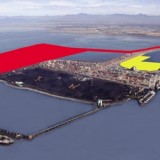“Blockbuster” hardly describes an internal DFO memo recently uncovered through the Cohen Commission on collapsing Fraser sockeye stocks – now made public in a blog by Don Staniford, the doughty fighter against Atlantic Salmon fish farmers, which battle has included a lawsuit by the shameless bastards.
The 2003 memo (download here) contains some truly shocking passages for their candour and for how clearly they vindicate those who have been critical of DFO’s salmon farm science. Written by a respected DFO scientist, Dr. Brent Hargreaves, the memo severely attacks the credibility of a colleague, key salmon farm apologist Dr. Dick Beamish, whose science Hargreaves labels as “shoddy” and “unethical”, among other pejoratives. Here are a couple of choice passages:
“The research on sea lice that has been conducted by Beamish has been strongly and widely criticized in both the scientific community and the public media…I think to a large degree it was the inadequacies of Beamish’s research and conclusions that led to the lack of public confidence in DFO science…
…I also do not want to be directly associated, either professionally or personally, with either Beamish or his research…He always does exactly as he pleases, regardless of the (often negative) impacts on DFO staff and research programs.”
First, a bit of background.
For nearly a decade we who were fighting Atlantic Salmon fish farms, led by the intrepid Alexandra Morton, were told by the provincial government that the “science” was on the side of the fish farms and that they would continue to permit the industry to expand.
The international scientific community familiar with the issue of sea lice from fish farms killing migrating Pacific Salmon supported her fight against. Her findings were published and peer-reviewed; several fish biologists also published papers condemning fish farms and Dr. Daniel Pauly of UBC, one of the most distinguished scientists in the world according to Scientific American, said flatly “the debate is over.”
Still, the Campbell government had the “science on their side.”
At the request of Premier Campbell, I presented him with an analysis of the scientific evidence which he ignored. He had the “science on his side.”
On it went – study begat study, all of which endorsed Alexandra Morton’s findings.
Still, the government pressed on. And so did Alex, who brought lawsuits, wrote, marched, all at considerable personal expense – not to mention the huge emotional beating she took.
And the Campbell government maintained that it had the “science on its side.” (Needless to say, Premier Christy Clark was part of that government in the critical early days.)
Alex has had lots of supporters very much including her “Boswell,” Don Staniford – here is an excerpt from is his July 13 release:
…The memo went on to describe Dr. Beamish’s scientific research as “unethical”, “unprofessional” and a “‘lapse’ in judgment”.
In his testimony to the Cohen Inquiry last week, which saw his career flash before his eyes like Klingons off the starboard bow of the Star Trek ship ‘The Enterprise’, Dr. Beamish said: “Maybe it’s aliens” before adding unbelievably: “Obviously I don’t believe in aliens”.
Dr. Beamish certainly doesn’t believe that sea lice from salmon farms are killing wild salmon and spent his career staunchly defending the Norwegian-owned salmon farming industry. At last year’s ‘Sea Lice 2010’ conference in Victoria, Dr. Beamish refused to answer questions on sea lice from salmon farms. This was even more incredible since Dr. Beamish was the plenary speaker in a session on ‘Wild/Farmed Interactions’.
The audience in the public gallery at the Cohen Inquiry last week were left in no doubt which side Dr. Beamish was on when he greeted Mary-Ellen Walling, executive director of the BC Salmon Farmers Association. “My inspiration,” he gushed as he hugged her like an old flame.
“This is bad science?” asked lawyer Greg McDade as he ripped apart Dr. Beamish’s scientific work. Thankfully, Dr. Beamish recently called last orders on his career with the DFO. His future scientific credibility would be in jeopardy otherwise.
I find it hard to speak on this – a rare thing for me – my anger is so intense. The scientist Campbell and co. relied upon so stubbornly was, according to a respected colleague, “unethical” and “unprofessional”.
Just one or two thoughts:
- The shit and abuse we all have taken, most especially Alex, at the hands of environmental turncoats like Patrick Moore to say nothing of Liberal Party hacks.
- The refusal of the government to apply the “precautionary principle” – it’s the law – placing the onus of proof on the industry not private citizens.
- The deliberate bias of the media who allowed the fish farm flack, Mary-Ellen Walling, to roam the op-ed pages virtually at will…and their utter lack of any scrutiny.
- The silence of the media columnists who trashed the government when it was NDP and have been struck dumb on this issue.
- The lawsuits Alex took and won and paid for – to a large extent – out of her own pocket.
- The lies of the industry, deliberate lies – I say deliberate because the largest shareholder of the biggest company, Marine Harvest, admitted that sea lice were slaughtering migrating wild salmon.
- The terrific support we’ve all had from the decent public which BC is mostly made up of.
- Most of all, the appalling loss of millions of our precious salmon – destroyed because the Liberal government consciously and deliberately refused to look at the massive evidence.
Will the Clark Liberals do the decent thing and apologize?
Not a chance. The moral compass of this bunch was set when Campbell got thrown in jail for drunk driving and imposed no penalty on himself.
Will they immediately act to stop all new licenses and give the present farmers 60 days to dismantle and leave?
You have to be kidding! Admit error? Bite the hand that feeds them? Show a little contriteness?
Hell will definitely freeze over before that happens.
Every single Liberal MLA from 2001 until now ought to hang their heads in shame.
I’m sure I speak for Alexandra Morton, her loyal “Boswell”, Don Staniford, and the thousands of citizens who have supported what often looked like a lost cause, in saying that the vindication of Dr. Hargreaves’ evidence is swamped by the sense of the massive loss of our province’s soul, the Pacific salmon, which would have lived were if not for deceit and negligence of a government which, if they had an ounce of decency, would resign en masse.




